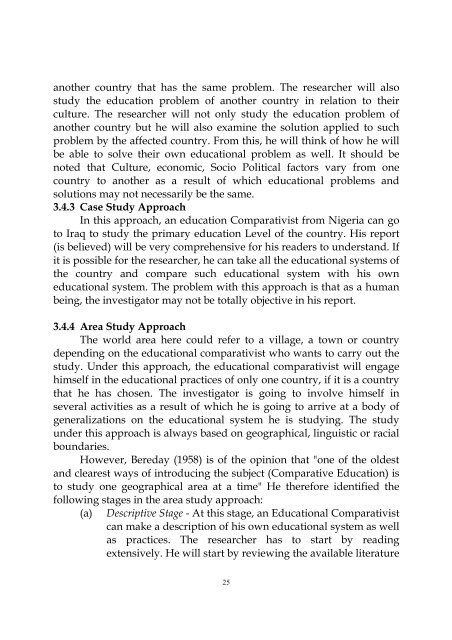edu 304 - comparative education - National Open University of Nigeria
edu 304 - comparative education - National Open University of Nigeria
edu 304 - comparative education - National Open University of Nigeria
Create successful ePaper yourself
Turn your PDF publications into a flip-book with our unique Google optimized e-Paper software.
another country that has the same problem. The researcher will also<br />
study the <strong>edu</strong>cation problem <strong>of</strong> another country in relation to their<br />
culture. The researcher will not only study the <strong>edu</strong>cation problem <strong>of</strong><br />
another country but he will also examine the solution applied to such<br />
problem by the affected country. From this, he will think <strong>of</strong> how he will<br />
be able to solve their own <strong>edu</strong>cational problem as well. It should be<br />
noted that Culture, economic, Socio Political factors vary from one<br />
country to another as a result <strong>of</strong> which <strong>edu</strong>cational problems and<br />
solutions may not necessarily be the same.<br />
3.4.3 Case Study Approach<br />
In this approach, an <strong>edu</strong>cation Comparativist from <strong>Nigeria</strong> can go<br />
to Iraq to study the primary <strong>edu</strong>cation Level <strong>of</strong> the country. His report<br />
(is believed) will be very comprehensive for his readers to understand. If<br />
it is possible for the researcher, he can take all the <strong>edu</strong>cational systems <strong>of</strong><br />
the country and compare such <strong>edu</strong>cational system with his own<br />
<strong>edu</strong>cational system. The problem with this approach is that as a human<br />
being, the investigator may not be totally objective in his report.<br />
3.4.4 Area Study Approach<br />
The world area here could refer to a village, a town or country<br />
depending on the <strong>edu</strong>cational comparativist who wants to carry out the<br />
study. Under this approach, the <strong>edu</strong>cational comparativist will engage<br />
himself in the <strong>edu</strong>cational practices <strong>of</strong> only one country, if it is a country<br />
that he has chosen. The investigator is going to involve himself in<br />
several activities as a result <strong>of</strong> which he is going to arrive at a body <strong>of</strong><br />
generalizations on the <strong>edu</strong>cational system he is studying. The study<br />
under this approach is always based on geographical, linguistic or racial<br />
boundaries.<br />
However, Bereday (1958) is <strong>of</strong> the opinion that "one <strong>of</strong> the oldest<br />
and clearest ways <strong>of</strong> introducing the subject (Comparative Education) is<br />
to study one geographical area at a time" He therefore identified the<br />
following stages in the area study approach:<br />
(a) Descriptive Stage - At this stage, an Educational Comparativist<br />
can make a description <strong>of</strong> his own <strong>edu</strong>cational system as well<br />
as practices. The researcher has to start by reading<br />
extensively. He will start by reviewing the available literature<br />
25
















